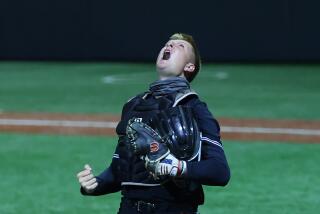These Teachers Have It Down to a Science
- Share via
A peek into Christine Clarke’s classroom might find students teaching one another physics concepts. Granville Yoshina’s pupils might be jumping to create mock earthquakes, and Wendy Kleeb’s kids could be making metamorphic cookies.
For their innovative approaches, the three science teachers have won the title of Orange County Science Educator of the Year for high school, middle school and elementary school, respectively.
The honors, bestowed by the Orange County Science Educators Assn., bring recognition to deserving teachers who go beyond the call of duty, the organization’s officials said.
“Christine exemplifies all that we talk about when we talk about excellence in teaching,” Sonora High School Principal Karla Taylor said of Clarke, who has been on the faculty at the La Habra campus for 13 years. “She’s the quintessential teacher who can manage the honors class or the class where students are academically challenged with equal ease. She motivates students at all levels.”
The principals at both Imperial Middle School in La Habra, where Yoshina has been teaching for 15 years, and McPherson Magnet, a school in Orange that Kleeb helped to open this year, have similar accolades for their distinguished teachers.
All three administrators pointed out that Clarke, Yoshina and Kleeb spend countless hours preparing lessons that spark enthusiasm for science by requiring students to participate.
“Kids need to have something in their hands so they can see it,” said Yoshina, who persuaded an engineering firm to donate a seismograph that he uses for lessons on earthquakes.
He is teaching his seventh-grade science class how to map ocean floors by using a skewer to simulate a measuring tool and a box with holes punched in it to represent the sea. The students are figuring out the depth of the surface by taking measurements and plotting them on a graph that they then transfer to a computer.
“We learn better in Mr. Yoshina’s class because we’re not just reading out of a textbook,” 12-year-old Nina Rahimi said.
Kleeb, who works as a registered nurse in an Anaheim Hills hospital at night, said conducting science projects helps students grasp complicated concepts. Earlier this year, Kleeb, who considers her teaching job a hobby, had her class make metamorphic cookies and conglomerate balls that they used to learn about rock formations.
Her pupils also used fudge to figure out how crystals form. “Fudge that cools at a slower pace produces much larger crystals,” she explained. The experiment allows her fourth-graders to “see overnight what happened within the earth’s layers over millions of years.”
Clarke also emphasizes projects in her high school physics class. She places her students, mostly 10th-graders, in groups of three and assigns them individual tasks from which they learn different concepts and teach one another.
“I have the kids develop lessons for me, and I just guide them with lots of positive strokes,” said Clarke, who developed her school’s successful integrated science program. She also coordinates the Medical Careers Academy on campus.
“Ms. Clarke is great,” said Brandi Sorsby, a 17-year-old honors student. “She makes sure you leave her class knowing something. I took her class when I was a freshman, and I still remember all of Newton’s laws. She got me to realize that science is really important and serves a purpose.”
Pupils in Clarke’s classes voiced similar sentiments, describing her as dedicated, caring and hard-working.
“She really loves all her students,” 16-year-old Robert Perez said. “She always says something positive about our work, and she’s always smiling.”
The three teachers, all of whom participate in numerous conferences to keep up with the latest research in science, also coordinate after-school activities and clubs.
Yoshina heads his school’s Future Scientists and Engineers of America club, which pairs students with professional engineers twice a week to work on projects for competition.
Clarke, who coordinates her school’s annual food drive and fund-raiser to provide meals for the needy during the holidays, is taking student applications now for membership in the new Sonora chapter of Future Scientists and Engineers of America.
Kleeb is one of her school’s coaches for the Science Olympiad team, which will compete with schools across Orange County this weekend.
The three educators said they appreciate the recognition but emphasized that they aren’t in their jobs for kudos.
“It’s just enjoyable to see youngsters’ eyes open to something they didn’t know before,” Yoshina said.
More to Read
Sign up for Essential California
The most important California stories and recommendations in your inbox every morning.
You may occasionally receive promotional content from the Los Angeles Times.













